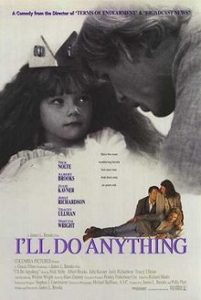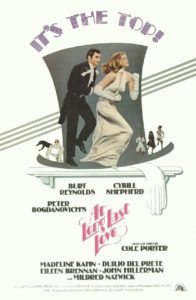 Right now, amid the inexplicable success of the self-satisfied croon-fest LA LA LAND, I think it’s a good time to look back at a like-minded film whose fortunes weren’t nearly as rosy. I’m referring to I’LL DO ANYTHING, a 1994 dramedy written, co-produced and directed by James L. Brooks that, as with LA LA LAND, explicitly paid tribute to the old time Hollywood musical formula and utilized non-singer actors in a self-referential moviemaking milieu. Unlike LA LA LAND, however, the $40 million I’LL DO ANYTHING wound up released with its musical numbers excised, and bombed mightily.
Right now, amid the inexplicable success of the self-satisfied croon-fest LA LA LAND, I think it’s a good time to look back at a like-minded film whose fortunes weren’t nearly as rosy. I’m referring to I’LL DO ANYTHING, a 1994 dramedy written, co-produced and directed by James L. Brooks that, as with LA LA LAND, explicitly paid tribute to the old time Hollywood musical formula and utilized non-singer actors in a self-referential moviemaking milieu. Unlike LA LA LAND, however, the $40 million I’LL DO ANYTHING wound up released with its musical numbers excised, and bombed mightily.
It’s no surprise the film wasn’t successful, as in its current form I’LL DO ANYTHING is disjointed and unsatisfying. Its story, of a failed actor (Nick Nolte) forced to look after his bratty young daughter (Whittni Wright) while chauffeuring a windbag movie producer (Albert Brooks, doing one of the several 90s-era movie impersonations of mega-mogul Joel Silver—see GRAND CANYON and TRUE ROMANCE for others), never quite gels, and falls apart completely in its third act, when Nolte’s daughter somehow becomes a sitcom star (a most unlikely development considering the girl, as incarnated by Ms. Wright, comes off as uncommunicative, hyperactive and plain weird).
The film’s message? That Hollywood is a fickle industry bound by shallowness and fear–profound stuff (and not dissimilar to Brooks’ previous film BROADCAST NEWS, which imparted the equally earth-shattering revelation that the TV news industry cares more about ratings and appearance than journalistic integrity.) This view is represented by Julie Kavner as a kind-hearted but cynical test screening analyst whose findings have more weight on a movie’s release than the intentions of its makers, a mighty ironic point considering I’LL DO ANYTHING’S fate.
Of the film’s intended musical version, it was jettisoned after an especially vicious test screening. According to the film’s composer Hans Zimmer, “That first preview was probably one of the low points of all our lives. People wanted to kill us!” Rumors have circulated about Nolte and his co-stars buying up and destroying copies of the film’s musical version and its songs, bootleg cassettes of which are said to have proliferated in Hollywood, and laughingly compared with “Springtime for Hitler.”
Prints of the original version of I’LL DO ANYTHING are reportedly MIA (with Zimmer claiming he “can’t find” recordings of any of the songs), meaning a director’s cut DVD won’t be appearing any time soon. Brooks apparently tried to make a documentary about the film’s production in the late nineties but was prevented by rights issues with the songs, several of which were utilized in other films. Right now all that exists of I’LL DO ANYTHING’S musical version, it seems, are VHS copies of the timecoded workprint.
Of that workprint, it’s just as unsatisfying in its way as the release version, which contains several crucial scenes (such as Nolte breaking down upon learning that he’s lost a plum movie role) that aren’t in the workprint, despite it having a longer running time (a whopping 2½ hours, versus the release version’s 115 minutes). This is an inevitable consequence, I’d say, of the postproduction clusterfuck to which I’LL DO ANYTHING was subjected; not that this was especially noteworthy or unusual, as copious reshoots and last-minute editing are mainstays on Brooks’s films, during which certain important elements are blunted, if not lost entirely.*
What the workprint version of I’LL DO ANYTHING isn’t is particularly interesting or even noteworthy. I’ll confess I was expecting a cinematic outrage on the order of THE DAY THE CLOWN CRIED, but in fact I’LL DO ANYTHING in its musical format plays like most all truly bad movies: dreary and dull. The songs, written by Prince, Sinead O’Connor, Carole King and others, never attain “Springtime for Hitler” levels of wrongheadedness—although I will admit that an early Albert Brooks sung tune containing the lines “I’ll do anything…Anything I’ll do…Ooooooooooo!” does come close. Otherwise, though, the tunes are pretty mediocre, despite a few catchy jingles (such as a refrain sung by Whittni Wright’s mother, played by Tracey Ullman: “Don’t talk to strangers…don’t cross on a yellow light…remember God, he made you…one day He’ll maaaaaaaaaake everything all right!”).
Worst of all, the whole thing feels half-hearted, with the Twyla Tharp choreographed musical numbers staged in shockingly pedestrian fashion. It seems that Brooks, despite his high falutin’ proclamations about musical cinema (“Through song you can get closer to the truth”), just couldn’t bring himself to fully embrace the format–or perhaps he didn’t know how to do so. As he once admitted, “my style when directing is that I really don’t know how to get people to suspend disbelief,” and the suspension of disbelief is a requirement in a movie musical. That half-heartedness extends to Brooks’s cast-members, Nolte in particular, whose one and only musical number is an indifferently performed duet with Wright (with the lyrics “Be my mirror, be like me…easier than A-B-C”) in which she easily upstages him.
That the musical version of I’LL DO ANYTHING is now lost is certainly no great tragedy, but it is interesting to contrast its fortunes with those of LA LA LAND.  Back in 1994 the idea of non-singing actors performing musical numbers was considered a heresy, and led to comparisons with the ultimate musical bomb: AT LONG LAST LOVE. That 1975 disaster, featuring Cybill Shepherd and Burt Reynolds crooning Cole Porter tunes, was so insanely reviled its writer-director Peter Bogdonovich (the ex-hubbie of I’LL DO ANYTHING’S late co-producer Polly Platt) complained that “It was treated as if we had committed one of the most heinous crimes ever, including child-murdering and rape.” I’m guessing the fate of AT LONG LAST LOVE, along with those of subsequent musical fiascoes like NEW YORK NEW YORK, CAN’T STOP THE MUSIC, XANADU, ONE FROM THE HEART, GIVE MY REGARDS TO BROAD STREET and BURT RIGBY YOU’RE A FOOL, probably had some bearing on Brooks’s decision to excise I’LL DO ANYTHING’S music numbers.
Back in 1994 the idea of non-singing actors performing musical numbers was considered a heresy, and led to comparisons with the ultimate musical bomb: AT LONG LAST LOVE. That 1975 disaster, featuring Cybill Shepherd and Burt Reynolds crooning Cole Porter tunes, was so insanely reviled its writer-director Peter Bogdonovich (the ex-hubbie of I’LL DO ANYTHING’S late co-producer Polly Platt) complained that “It was treated as if we had committed one of the most heinous crimes ever, including child-murdering and rape.” I’m guessing the fate of AT LONG LAST LOVE, along with those of subsequent musical fiascoes like NEW YORK NEW YORK, CAN’T STOP THE MUSIC, XANADU, ONE FROM THE HEART, GIVE MY REGARDS TO BROAD STREET and BURT RIGBY YOU’RE A FOOL, probably had some bearing on Brooks’s decision to excise I’LL DO ANYTHING’S music numbers.
The irony here is that these days AT LONG LAST LOVE would probably be given a far warmer reception than it got (and indeed, the 2013 Blu-ray release of that film was quite warmly received). Now, after all, non-singing actors are mainstays in musical cinema (see CHICAGO, WALK THE LINE, INTO THE WOODS, etc.), and bad singing is encouraged even when professional crooners are involved (see LES MISERABLES). Such an approach can be said to impart “realism,” or perhaps, as one critic opined about LA LA LAND’s writer-director Damien Chazelle, a reverence of sorts for past musicals, “as if Chazelle is saying, after each flat note or out-of-focus face, “See how much better things used to be?””
In this atmosphere I think the musical version of I’LL DO ANYTHING could conceivably find an appreciative audience. Speaking for myself I can attest that, crummy though I’LL DO ANYTHING is, I’d much rather watch it than sit through LA LA LAND again!
*As evinced by BROADCAST NEWS’ famous non-ending, as well as the denouement of Brooks’s SPANGLISH (2004), which concludes in the blandest and least satisfying manner imaginable. See also HOW DO YOU KNOW from 2010, which, as pointed out by Roger Ebert, contains a stunning absence: its lead, played by Reese Witherspoon, is a professional softball player whose passion for the sport is so intense the film opens with her as a little girl hitting a ball, yet, inexplicably, we never get to see the adult Witherspoon doing so.
